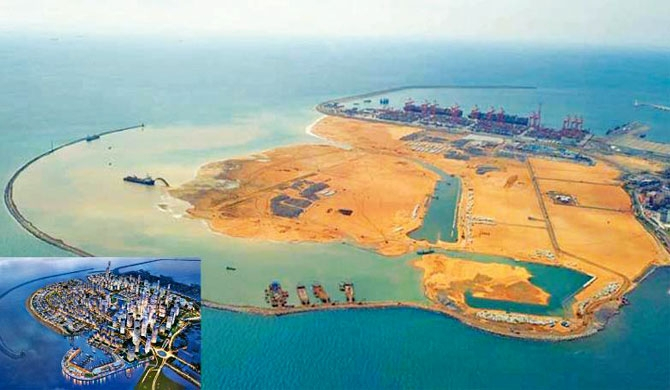Concerns have been raised over possible security threats to the Colombo Port City.
The concerns were raised at a virtual closed door round table discussion hosted by the Institute of National Security Studies (INSS).
The Institute of National Security Studies, the premier think tank on national security established under the Ministry of Defence, organized a discussion on “Urban Security and Safety: the Port City” with the participation of experts from the tri-forces.
INSS was the first institute to identify the importance of a strategic security plan for the Colombo Port City, at a time there is no discussion about a security plan in the foreseeable future.
The speakers at the discussion included Colonel General Staff, Security Forces West from the Sri Lanka Army Colonel BMA Balasooriya, the Commanding Officer of SLNS Rangalla of the Sri Lanka Navy Captain Rohan Joseph and Group Captain Poojana Gunathilake, Commanding Officer of No. 8 Light Transport Squadron from the Sri Lanka Air Force Base in Ratmalana.
The Moderator, Rear Admiral Dimuthu Gunawardena, Director of Communication and Publication welcomed the guest speakers and briefly introduced the topic in discussion, explaining the urgency to discuss the physical security of the Colombo Port City.
The audience consisted of the INSS staff and invitees from the tri-forces.
“When the Port City is emerging as an economic hub and a maritime center in the Indian ocean, ensuring security becomes a priority for all,” the Ministry of Defence said.
Colonel Balasooriya highlighted that joint security operations and conducting foresight analysis are two vital steps to maximize urban security and safety within the Port City area.
Captain Joseph discussed the maritime security perspective of the Colombo Port City, emphasizing on the importance of a proactive rather than a reactive response to the foreseeable and unforeseeable threats befalling the new piece of land.
He proposed that achieving physical security could only be implemented through a multi-pronged approach and an overarching security policy and a strategy, without which the intended economic ambitions would be severely handicapped.
Referring to the aerial security dimension, Group Captain Poojana Gunathilake illustrated how the Port City will increase and diversify air movements by private entities, culminating in new security concerns.
He therefore recommended to re-visit the existing aerial defence network to upgrade low level detection capabilities, and incorporate the Port City to the wider national air security framework.
The Defence Ministry said that all three guest speakers stressed on the critical need of conducting a comprehensive threat analysis and creating a national policy for the Colombo Port City.





